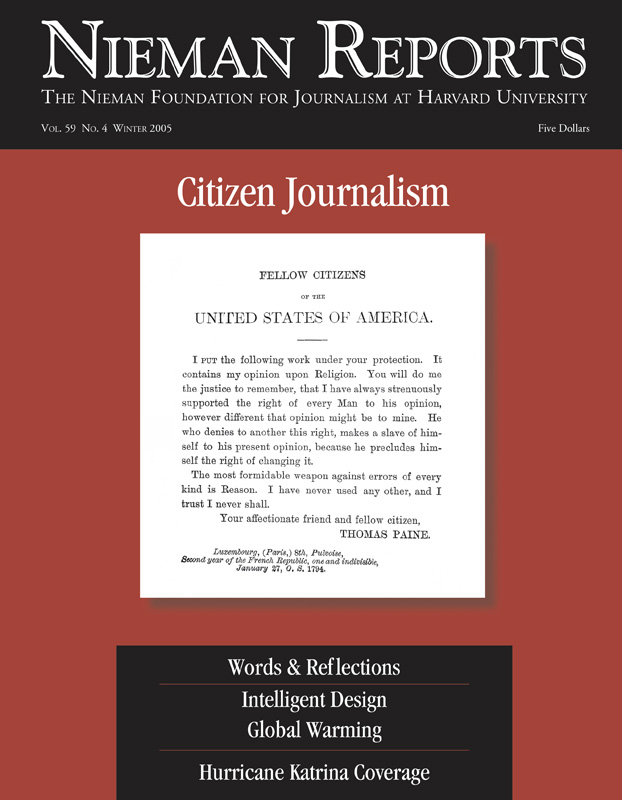Emotions were mixed for Anthony Shadid as he observed the historic spectacle of armored columns of U.S. troops rumbling through Baghdad in April 2003, signaling the end of Saddam Hussein’s regime. The landmark tumbling of Hussein’s statue in Firdos Square, a thoroughly unimaginable turn of events for Iraqis, was on television for an astonished world to witness. “I was in awe of the power of my country, America,” Shadid writes in his masterful account, “Night Draws Near: Iraq’s People in the Shadow of America’s War.” “What other nation, driven by ideology, its existence not threatened, could conquer an entire country in a matter of weeks?” As an Arab American, however, the Oklahoma native acknowledges that this was not a moment of unalloyed elation, a sentiment shared by many Iraqis who loathed Hussein and his brutal rule. “Here was Baghdad, an ancient city whose name evoked a proud, enduring memory, fallen to a foreign enemy,” Shadid writes.
Shadid, a Washington Post correspondent who won a Pulitzer Prize in 2004 for his stellar and courageous work in Iraq, has written a book that embraces such nuance. This is not a policy screed or a compilation of talking heads and experts. Its best moments are based on old-fashioned reporting, leavened with the kind of analysis that only a certain distance and time—and a touch of wisdom—can render. Viewed as a work of documentation, Shadid’s book is an essential account of the chaos and violence of the U.S. invasion and of the subsequent looting and anarchy that set the stage for the ongoing crisis.
It is never an easy task for daily journalists to revisit their scrawled notes and process their experiences in the field with an eye towards crafting a broader narrative. Too often, as history skids by, we remain enveloped in the minute-to-minute tumult. But Shadid has managed to pull it all together and transcend the daily in dazzling fashion. His book is also testament to a time when reporters could roam more or less freely throughout Iraq, though we always did have to be careful. Iraq, long a closed society, was a place where stories seemed to be everywhere following the fall of Hussein. A reporter could drive to Basra or the Syrian border or Kurdistan, and most everywhere else, in relative confidence of coming back alive and with a good story. Alas, the bloody events of spring 2004 set into motion a cycle of kidnappings and killings that has made much of Iraq off-limits to journalists, especially Westerners. To wander freely in places like Fallujah and Khalidiya, Sunni Arab insurgent strongholds that Shadid visited, is no longer possible.
The book, following Shadid’s arc through the country on reporting trips before and after Hussein’s fall, is filled with the kind of insights—and personal anecdotes—that only long conversations with Iraqis, and time in the country, can provide. He recounts the brutalized nature of Iraqi society, warped in so many ways after Hussein’s mercurial rule and his catastrophic invasions of neighboring Iran and Kuwait, the latter followed by a decade of bruising international sanctions and isolation. Much of the world has come to recognize Iraq’s ethnic and religious divisions—its distinct Sunni, Shiite and Kurdish populations, along with Christians and other minorities—but Shadid notes the folly of simply labeling groups, as U.S. administrators who arrived in Baghdad often seemed to do. Shadid reminds readers that Iraqis are often offended to be asked directly if they are Shiite or Sunni; the nation, in particular Baghdad, includes many mixed families and, in the countryside, tribal affiliation often trumps all other identities.
Iraq, a place seeped in history and never-forgotten slights, is also overflowing with complications, distinctions and subtleties, not to mention contradictions. Hussein’s Baathist state simultaneously engaged in ghastly repression of Shiites and Kurds and heaped patronage on largely Sunni Arab zones, while officially backing a nationalist vision that discouraged ethnic and sectarian identity. To the outsider, the roiling, war-torn Iraq of today must seem a cauldron of ethnic and religious tensions—and so, lamentably, it has become. But it was not too long ago that Iraq was a well-off secular state, a place where people from throughout the Arab world came to study and women enjoyed considerable freedoms. The U.S. overseers who arrived after the war liked to talk about diversity, democracy, freedom and other hallowed concepts. But one often got the impression that these were abstractions for even educated Iraqis as they suffered through a lack of electricity, miles-long gas lines, and the fearsome violence that pummeled their nation.
“What are the Americans all about?” an exasperated Wamidh Nadhme, an eminent academic and political commentator, asked Shadid at one point. “What do they want?”
Nadhme, a rumpled, decent man who occasionally met with Western reporters on his peaceful veranda along the Tigris, serves as a reality check for Shadid during his years traveling back and forth to and from Iraq. He is among the most memorable of the Iraqi characters who inhabit these pages. Early on, as Hussein’s rule is crumbling, he sounds a prescient note of caution. “Even if the Americans are capable of overthrowing the regime, they will face more and more resistance,” Nadhme predicted. “It will bring more destruction, more civil war, and a nationalist war against American intervention.” Later, with Hussein in shackles and the country in turmoil, Nadhme concludes, “The Americans have opened a Pandora’s box.”
Patrick J. McDonnell, a 2000 Nieman Fellow, is the former Baghdad bureau chief and current bureau chief in Buenos Aires for the Los Angeles Times.



